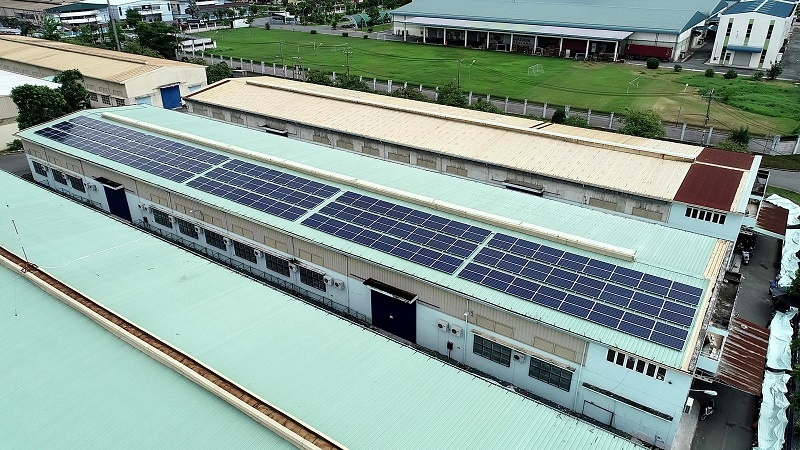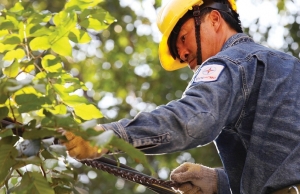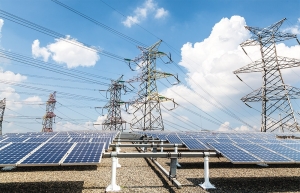Open mechanisms proposed in latest Electricity Law draft
The draft amendment is seen by businesses as encompassing diverse regulations that aim to establish a competitive and transparent electricity market, diversify ownership models and business methods, and encourage investment in renewable sources such as wind and solar power.
 |
| Installed rooftop solar panels at a workshop space in Dong Nai province |
"We are pleased that some of our suggestions have been acknowledged and included in this fifth draft. We agree with the revisions, which aim to ensure alignment with current realities and facilitate the development of the local electricity market while addressing ongoing challenges in renewable energy," said Pham Linh Ngan, head of the Secretariat of the Power and Energy Working Group at the Vietnam Business Forum (VBF).
Ngan was speaking at a workshop seeking input on amending the Electricity Law draft, hosted by the National Assembly Committee on Science, Technology and Environment in tandem with the Vietnam Chamber of Commerce and Industry, in Ho Chi Minh City on September 6.
However, many businesses remain concerned about the electricity purchase price with state-owned power authority Vietnam Electricity (EVN).
"We need clarification on whether the winning bid price will be the price used to sign the power purchase agreement (PPA) with EVN, or whether the investor will need to renegotiate the price after winning the bid. We believe the winning bid price should be the one used to sign the PPA without further negotiations," Ngan said.
Regarding rooftop solar power, although the prime minister has issued Decree No.80/2024/ND-CP concerning direct solar power purchase agreements, specific mechanisms for investors are still lacking.
Pham Dang An, deputy general director of Vu Phong Energy Group in Binh Duong, noted that while the latest amendment includes provisions on the wholesale electricity price between third parties, it should also include regulations allowing third-party investors to participate in rooftop solar projects through PPAs. This would help businesses access financing, ease cash flow pressures, and promote renewable energy growth.
"This is particularly necessary as businesses look to utilise renewable energy and require flexible financial solutions to achieve green transitions. If a manufacturing company must self-invest and operate its own energy needs, meeting those demands will be difficult," An said.
To increase flexibility in electricity trading, Ngan from VBF proposed that in cases where electricity projects have not yet determined a standard electricity selling price, and where power plants engage in direct transactions via their private connection lines, producers and buyers should be free to set their own prices.
Many businesses In the southern region investing in rooftop solar power are facing challenges related to grid connection and selling prices.
Nguyen Duy Thinh, Project Investment and Development director at SolarBK, a top renewable energy solutions provider in Vietnam, pointed out that the current Electricity Law does not clearly define the concept of connecting to the national power grid.
"Despite it being a fundamental concept, there remain different opinions on how to determine whether a project is indirectly or directly connected to the national grid. The Electricity Law needs to clarify this concept," Thinh said.
On the issue of grid connection, An from Vu Phong Energy Group suggested that the amended law should specify procedures for connecting rooftop solar power systems to the grid and include safety standards for fire prevention.
"Clear regulations will ensure the safety of the national grid, protect investors' rights, and help businesses maximise the benefits from renewable energy projects," An said.
In terms of investment in electricity projects, lawyer Cao Tran Nghia from Japanese-backed law firm Nishimura & Asahi Vietnam explained that foreign investors are concerned about the feasibility of funding provisions outlined in the Electricity Law.
Nghia suggested that to enhance the creditworthiness of state-owned businesses like EVN, the Compiling Committee might include a government commitment to ensuring the stability of buyers during the execution of power purchase agreements.
"This should include addressing EVN's debt obligations to investors, ensuring cash flow stability for both investors and project financiers," Nghia said.
 | Durable electricity supply to be ensured Escalating power consumption has sparked an imperative to boost construction of a transmission line and simultaneously mobilise maximum capacity from coal-fired and gas-to-power plants to ensure adequate electricity supply this summer. |
 | Proposed VAT rule pros and cons for digital products In alignment with the current 10-year socioeconomic development strategy in Vietnam, the draft amended VAT law is currently being developed by the Ministry of Finance, which is seeking input from businesses and business associations to finalise the draft in the near future. |
 | Electricity legislation revamp in demand Legislators are beginning to pore over changes to the Electricity Law that could aim to attract private investors while ensuring transparency in both prices and supply. |
What the stars mean:
★ Poor ★ ★ Promising ★★★ Good ★★★★ Very good ★★★★★ Exceptional
 Tag:
Tag:
Related Contents
Latest News
More News
- Momentum is real in the race to net-zero emissions (February 02, 2026 | 08:55)
- $100 million initiative launched to protect forests and boost rural incomes (January 30, 2026 | 15:18)
- Trung Nam-Sideros River consortium wins bid for LNG venture (January 30, 2026 | 11:16)
- Vietnam moves towards market-based fuel management with E10 rollout (January 30, 2026 | 11:10)
- Envision Energy, REE Group partner on 128MW wind projects (January 30, 2026 | 10:58)
- Vingroup consults on carbon credits for electric vehicle charging network (January 28, 2026 | 11:04)
- Bac Ai Pumped Storage Hydropower Plant to enter peak construction phase (January 27, 2026 | 08:00)
- ASEAN could scale up sustainable aviation fuel by 2050 (January 24, 2026 | 10:19)
- 64,000 hectares of sea allocated for offshore wind surveys (January 22, 2026 | 20:23)
- EVN secures financing for Quang Trach II LNG power plant (January 17, 2026 | 15:55)



























 Mobile Version
Mobile Version